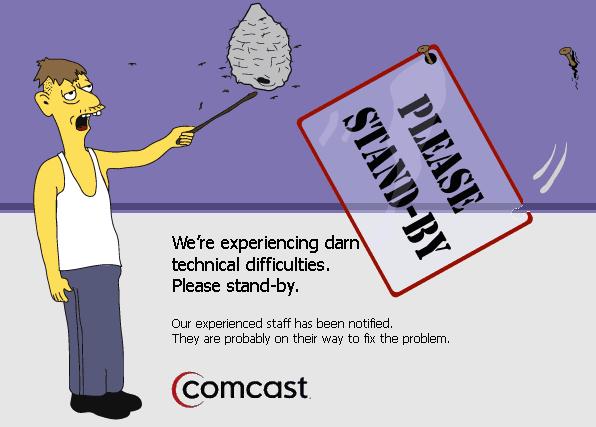 The Oscars viewing party in Shreveport nearly never happened late last month when Comcast dropped the ball and left a “Technical Difficulties” message on subscribers’ screens for several hours. An enterprising technician at a local TV station saved the day when he found old-fashioned rabbit ears and a digital tuner in the back of his truck and was able to get the local ABC affiliate’s over-the-air signal on the big screens at the Robinson Film Center.
The Oscars viewing party in Shreveport nearly never happened late last month when Comcast dropped the ball and left a “Technical Difficulties” message on subscribers’ screens for several hours. An enterprising technician at a local TV station saved the day when he found old-fashioned rabbit ears and a digital tuner in the back of his truck and was able to get the local ABC affiliate’s over-the-air signal on the big screens at the Robinson Film Center.
The technical foul-up was just the latest embarrassment for Comcast, not only because the outage impacted subscribers across a 75-mile radius, but also because Shreveport has a thriving partnership with the film industry. It also may be the breaking point for city officials tired of hearing complaints Comcast refuses to fix themselves.
Comcast blamed the latest widespread outage on a power problem.
“Comcast experienced a commercial power outage Sunday night,” said Frances Smith, a representative from Comcast’s government and regulatory affairs. “We are investigating and indications are that a resulting power surge damaged the switch that transfers the headend operation to a generator. We restored the majority of service within two hours and deeply regret the inconvenience to our customers.”
No refunds or service credits for customers are planned, unless those affected specifically ask for them within 30 days of the outage.
Comcast’s 15-year franchise with the city of Shreveport expired at the end of 2012 and the company is not making any friends on the Shreveport City Council as renewal discussions plod on while complaints from subscribers continue to pour in.
Most of the problems with Comcast service in Louisiana’s third largest city relate to the length of service outages, unresponsive customer service, and the quality of cable TV reception.

Webb
Comcast officials promised upgrades six years ago to address reliability issues, but city councilman Ron Webb says he hasn’t seen them and Comcast never delivered.
“We’re not trying to run them out of town,” Webb told KTRE-TV. “I want them to provide a good service. I have everything that I own bundled with them, and I’m paying dearly for it. But I’m happy to have the service. But I just want to see those improvements. I have the same problems.”
City officials are expecting Comcast officials to appear before the city council this evening to explain themselves and report on what plans they have to fix ongoing service complaints.
As it stands, Comcast continues to operate in Shreveport on a month-to-month basis until either a new franchise agreement is signed or another cable company responds to the city’s invitations to apply for a franchise. To date, no cable company has been willing to challenge Comcast’s presence in the city. In fact, Dale Sibley, the city’s chief administrative officer told the Shreveport Times no company even responded to their requests.
[flv width=”640″ height=”380″]http://www.phillipdampier.com/video/KTBS Shreveport Comcast Contract Expires 9-19-12.flv[/flv]
Comcast’s problems have been ongoing in Shreveport for years. Last September, KTBS hinted that the city was considering replacing Comcast with a different cable operator. But as other cities have already learned, no major cable operator is willing to challenge another. (Sept. 19, 2012) (3 minutes)
[flv width=”480″ height=”290″]http://www.phillipdampier.com/video/KTBS Shreveport Comcast Outage Contract 2-25-13.mp4[/flv]
The night of the Academy Awards was a low-key affair in Shreveport after Comcast went out of service across the city for at least two hours, leading to questions from city officials. KTBS in Shreveport rescued at least some viewers attending a downtown reception when a station technician hooked up an antenna and picked up the station’s broadcast signal. (3 minutes)
[flv width=”440″ height=”276″]http://www.phillipdampier.com/video/KMSS Shreveport Comcast issues statement about cable outage 2-25-13.flv[/flv]
At least 24 hours after Comcast’s February outage, some subscribers were still without cable service, despite claims from the cable company the outage only lasted two hours. KMSS in Shreveport reports. (1 minute)
[flv width=”640″ height=”500″]http://www.phillipdampier.com/video/KSLA Shreveport Cable outage sparks heat between Comcast city official 2-24-13.mp4[/flv]
KSLA in Shreveport says Comcast’s ongoing service problems are being heard by members of the city council. Now some say the company never followed through on service improvements promised six years earlier. (2 minutes)
[flv width=”480″ height=”288″]http://www.phillipdampier.com/video/Shreveport Times Comcast-talk-council-about-service-improvements 3-12-13.flv[/flv]
The Shreveport Times talks about tonight’s city council meeting which is scheduled to discuss Comcast’s service problems, the company’s franchise renewal, and obstacles that prevent another provider from taking over and delivering better service. (3 minutes)


 Subscribe
Subscribe Alex Dudley, a specialist in corporate crisis communications, has left Time Warner Cable after serving as the cable company’s group vice president of public relations, to take an executive position at Charter Communications.
Alex Dudley, a specialist in corporate crisis communications, has left Time Warner Cable after serving as the cable company’s group vice president of public relations, to take an executive position at Charter Communications. Both Time Warner Cable and Verizon don’t think you want or need gigabit fiber broadband — the kind of service now available in Kansas City from Google Fiber.
Both Time Warner Cable and Verizon don’t think you want or need gigabit fiber broadband — the kind of service now available in Kansas City from Google Fiber.

 Data caps protect incumbent big studio and network content creators at the expense of independent producers and others challenging conventional entertainment business models.
Data caps protect incumbent big studio and network content creators at the expense of independent producers and others challenging conventional entertainment business models.
